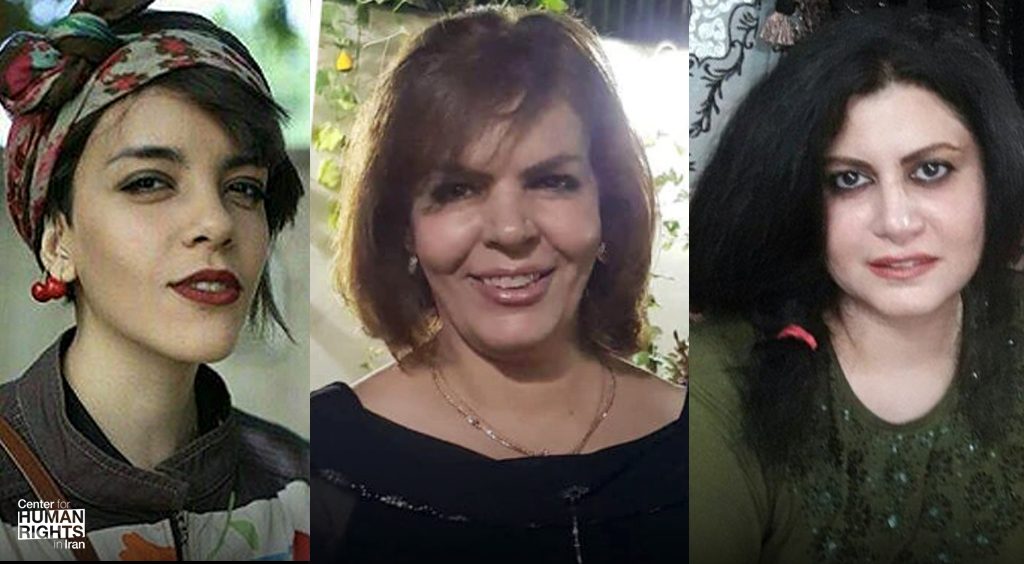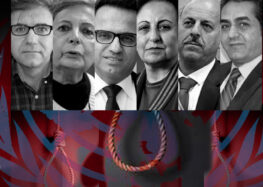Iran Moving Women Political Prisoners to Jails with “Common Criminals”
 Sotoudeh and Three Other Activists Transferred Out of Evin’s Women’s Ward to Other Prisons
Sotoudeh and Three Other Activists Transferred Out of Evin’s Women’s Ward to Other Prisons
As part of a new policy to isolate political prisoners by incarcerating them alongside common criminals at various prisons in Iran, three women convicted of national security crimes for opposing Iran’s mandatory hijab laws were recently transferred out of Evin Prison’s Women’s Ward, the Center for Human Rights in Iran (CHRI) has learned.
Yasaman Ariyani and her mother Monireh Arabshahi, were transferred to Kachuei Prison in Karaj, west of Tehran, and Samaneh Norouz-Moradi to the central prison in Roudsar, northern Iran.
The move follows the sudden transfer of human rights lawyer Nasrin Sotoudeh from Evin Prison in Tehran to Gharchak Prison in the city of Varamin, south of Tehran, on October 13, 2020, under the pretext that she has been convicted of a common crime and no longer “qualified” to be in a security ward.
“I heard about the transfer of my clients through another prisoner and I was shocked,” attorney Babak Paknia, representing all three activists, said in an interview with CHRI on October 22, 2020.
“The judicial authorities justify their action by pointing to new circumstances in prisons in the coronavirus era and they believe it would be preferable to send prisoners convicted of common crimes to cities of their birth,” he added.
However, the fact that all communications regarding the three women was with a judge presiding over security cases, debunks the claim that their convictions were for a common crime, Babaknia noted.
“This shows that despite what the authorities are saying, my clients have security convictions and moving them to the cities of their birth under the guise of being common criminals, is unacceptable,” the attorney told CHRI.
Attorney: They are using “trickery and lies” to transfer prisoners
Yasaman Ariyani is a theater actress arrested on April 10, 2020, for anti-forced hijab campaigns, serving a five-and-a-half-year prison sentence for “encouraging people to corruption and prostitution,” “assembly and collusion against national security” and “propaganda against the state.”
Her mother Monireh Arabshahi, arrested on April 11, 2020, is a civil activist and anti-compulsory hijab protester serving the same sentence.
Samaneh Norouz-Moradi, arrested in August 2018, is serving a sentence for “assembly and collusion against national security through membership in adversary channels (on the Telegram messaging app), such as the campaign for the return of the Prince [Reza Pahlavi], “insulting the Founder of the Islamic Republic and Leader of the Revolution [Rouhollah Khomeini]” and “propaganda against the state.”
In July 2020, Norouz-Moradi was also sentenced to an additional 15 months in prison for chanting “long live the shah (king)” in a video message.
All three women were transferred thinking they were meeting their lawyer, according to Babak Paknia.
“I got the news from inside (Evin) Prison that Yasaman Ariyani, Monireh Arabshahi, and Samaneh Norouz-Moradi were told by agents that their lawyer wants to meet them,” Paknia told CHRI.
“With that in mind, my clients were taken out of the ward and then moved to prisons in Karaj and Roudsar.”
The attorney continued: “The repeated use of trickery and lies to transfer prisoners a short time after doing the same against Nasrin Sotoudeh, raise a lot of questions.
“If the judicial authorities want to transfer prisoners, they can do so very easily since prisoners don’t have much power to resist. Using tricks is unjustified. It will add to the judiciary’s notoriety in people’s minds.”
Nasrin Sotoudeh, Dangerously Weak, Transferred to Harsh Gharchak Prison
Meanwhile, human rights lawyer Nasrin Sotoudeh’s transfer on October 13, 2020 from Evin Prison’s Women’s Ward, where she had been returned from hospital against the doctors’ urgings, to Gharchak Prison, which is notorious for its dangerous and inhumane conditions, has caused significant concern, given her deteriorated medical condition after her hunger strike from August 11 to September 26.
On October 20, 2020, the head of public relations for the Tehran Province Prisons Organization was quoted by the judiciary’s official news agency, Mizan, that Sotoudeh transfer was in compliance with her sentence.
“Nasrin Sotoudeh was sentenced to five years in prison for the criminal act of assembly and collusion with the intention to acting against national security and one year in prison for acting against the State of the Islamic Republic. Also, recently she was sentenced to 12 years in prison for a common crime, which has become finalized and mandatory to enforce,” the unnamed official said.
[He did not specify what the “common crime” was.]
The PR official added: “As a result of combining all her other convictions in accordance with Article 134 of the Islamic Penal Law, the maximum punishment applied to this prisoner will be 12 years in prison.”
He continued: “In reference to Note B of Article 7 of the Regulations for the Separation and Classification of Prisoners, prisoners convicted of a common crime—that would include Nasrin Sotoudeh—are not qualified to be held in a security ward.”
“Given that this sentence has recently become final and the 12-year prison sentence is mandatory, Nasrin Sotoudeh has been transferred to the general ward of the Tehran Province Women’s Prison (Gharchak Prison).”
According to women’s rights activist Shima Babaei, as of October 4, 2020, there were “about 40 political prisoners” in Evin Prison’s Women’s Ward alone.
*This article was revised on November 18, 2020, to reflect that Yasaman Ariyani and her mother Monireh Arabshahi were moved to Kachuei Prison in Karaj, not Rajaee Shahr Prison.






